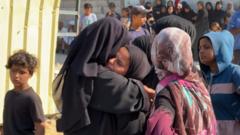**Macron emphasizes the need for a cohesive international response to ongoing conflicts to avoid further erosion of credibility and alliance with Asia.**
**Macron Urges West to Act on Ukraine and Gaza to Maintain Global Credibility**

**Macron Urges West to Act on Ukraine and Gaza to Maintain Global Credibility**
**French President warns that inaction may lead to perceptions of double standards among Western nations during Shangri-la Dialogue.**
In a recent address at the Shangri-la Dialogue in Singapore, French President Emmanuel Macron expressed urgent concerns that the United States and Europe could jeopardize their international credibility unless they resolve the ongoing conflicts in Ukraine and Gaza swiftly. Macron warned that failure to act could lead to accusations of double standards, especially as tensions rise between the West and authoritarian regimes.
During his address, Macron appealed for stronger ties between Europe and Asia, urging Asian nations to form a new alliance that safeguards them from becoming collateral damage in the escalating power struggles between the U.S. and China. The dialogue's audience included high-ranking officials, such as U.S. Defence Secretary Pete Hegseth, as Macron highlighted the complex geopolitical landscape at play.
"The implications of letting Russia annex Ukrainian territory without consequence could reverberate dangerously across Asia," Macron cautioned. He drew parallels to potential aggressive moves by China concerning Taiwan and emphasized that the West needed to present a unified front to maintain credibility and defend shared values of sovereignty and territorial integrity.
Addressing the conflict in Gaza, Macron acknowledged perceptions that the West has turned a blind eye to Israel's actions. He underscored the necessity of advocating for a ceasefire while recognizing Palestinian statehood, stating, "If we abandon Gaza, we undermine our credibility worldwide."
Macron's remarks followed criticisms of Israel from various European leaders, particularly regarding the humanitarian crisis in Gaza. The French leader's call for consistency in international relations reflects a growing frustration over perceived discrepancies in how the West handles differing conflicts.
He further articulated his vision for "strategic autonomy," seeking to promote cooperation between nations while maintaining individual sovereignty. He remarked that countries should not rely solely on external powers for guidance, referencing challenges like U.S. tariffs and the unpredictability of American security commitments.
By underscoring the interconnectedness of global security challenges—from Russia's war in Ukraine to North Korea's support of Russia—Macron's speech calls for a reassessment of how Western nations can work together more effectively alongside Asian countries.
Analysts note that Macron's candid comments might be received with skepticism by China, particularly concerning Taiwan. However, his vision may resonate with various nations in Asia that are eager for alternatives to the binary U.S.-China dynamic. In this climate, many countries are looking to forge a robust, multilateral framework that promotes stability while addressing the threats posed by superpower rivalries.
During his address, Macron appealed for stronger ties between Europe and Asia, urging Asian nations to form a new alliance that safeguards them from becoming collateral damage in the escalating power struggles between the U.S. and China. The dialogue's audience included high-ranking officials, such as U.S. Defence Secretary Pete Hegseth, as Macron highlighted the complex geopolitical landscape at play.
"The implications of letting Russia annex Ukrainian territory without consequence could reverberate dangerously across Asia," Macron cautioned. He drew parallels to potential aggressive moves by China concerning Taiwan and emphasized that the West needed to present a unified front to maintain credibility and defend shared values of sovereignty and territorial integrity.
Addressing the conflict in Gaza, Macron acknowledged perceptions that the West has turned a blind eye to Israel's actions. He underscored the necessity of advocating for a ceasefire while recognizing Palestinian statehood, stating, "If we abandon Gaza, we undermine our credibility worldwide."
Macron's remarks followed criticisms of Israel from various European leaders, particularly regarding the humanitarian crisis in Gaza. The French leader's call for consistency in international relations reflects a growing frustration over perceived discrepancies in how the West handles differing conflicts.
He further articulated his vision for "strategic autonomy," seeking to promote cooperation between nations while maintaining individual sovereignty. He remarked that countries should not rely solely on external powers for guidance, referencing challenges like U.S. tariffs and the unpredictability of American security commitments.
By underscoring the interconnectedness of global security challenges—from Russia's war in Ukraine to North Korea's support of Russia—Macron's speech calls for a reassessment of how Western nations can work together more effectively alongside Asian countries.
Analysts note that Macron's candid comments might be received with skepticism by China, particularly concerning Taiwan. However, his vision may resonate with various nations in Asia that are eager for alternatives to the binary U.S.-China dynamic. In this climate, many countries are looking to forge a robust, multilateral framework that promotes stability while addressing the threats posed by superpower rivalries.




















